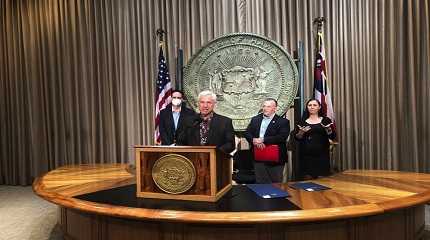
HONOLULU (AP) — Hawaii Gov. Josh Green signed on Friday seven good-government bills drafted in response to news last year that two former lawmakers had accepted bribes in exchange for influencing legislation.
One measure, HB137, would require lobbyists to report not only the general subject they are advocating for but the specific bill number or the identification number of the program they discussed with officials.
“It’s a simple change, but one that will shed more light on the actions of lobbyists,” Sen. Karl Rhoads, a Democrat and chair of the Senate Judiciary Committee, said at a bill signing ceremony.
Another, HB142, makes it illegal not only for lawmakers to accept certain gifts but also for lobbyists to give those gifts. Rhoads called this “a small but important distinction.”
Lawmakers have been considering a number of bills addressing ethics, lobbying and campaign spending reform this legislative session.
Rep. David Tarnas, chair of the House Judiciary and Hawaiian Affairs Committee, said the public had made very clear that it wasn’t acceptable for government officials, elected officials and government employees to act unethically and engage in fraud and corruption.
“These bills will improve transparency in government,” said Tarnas, a Democrat. “They will strengthen election integrity and advance campaign finance reform in very meaningful ways.”
Green thanked the lawmakers for their work before signing the legislation. He indicated he was ready to sign additional bills sent his way.
“Taken together in their entirety, this is a very good initial package of government reform,” the Democrat said.
Former state Rep. Ty Cullen and former state Sen. Kalani English, both Democrats, pleaded guilty to honest services wire fraud last year. They admitted accepting envelopes of cash and other bribes from a business owner in exchange for shaping legislation while in office.
English was sentenced to three years and four months in prison. Cullen is scheduled to be sentenced on Thursday.
Many of the bills lawmakers have been considering were referred to the Legislature by the Commission to Improve Standards of Conduct, a panel the House created last year in response to the bribery scandal. Others were submitted by the Hawaii State Ethics Commission, the Campaign Spending Commission and the Office of Elections.
Green also signed HB99, which limits the amount of cash a campaign can accept from a single person during each election period to $100. Lawmakers said cash contributions to political campaigns can be difficult to trace. This measure aims to make violations of campaign finance law easier to detect and prevent.




